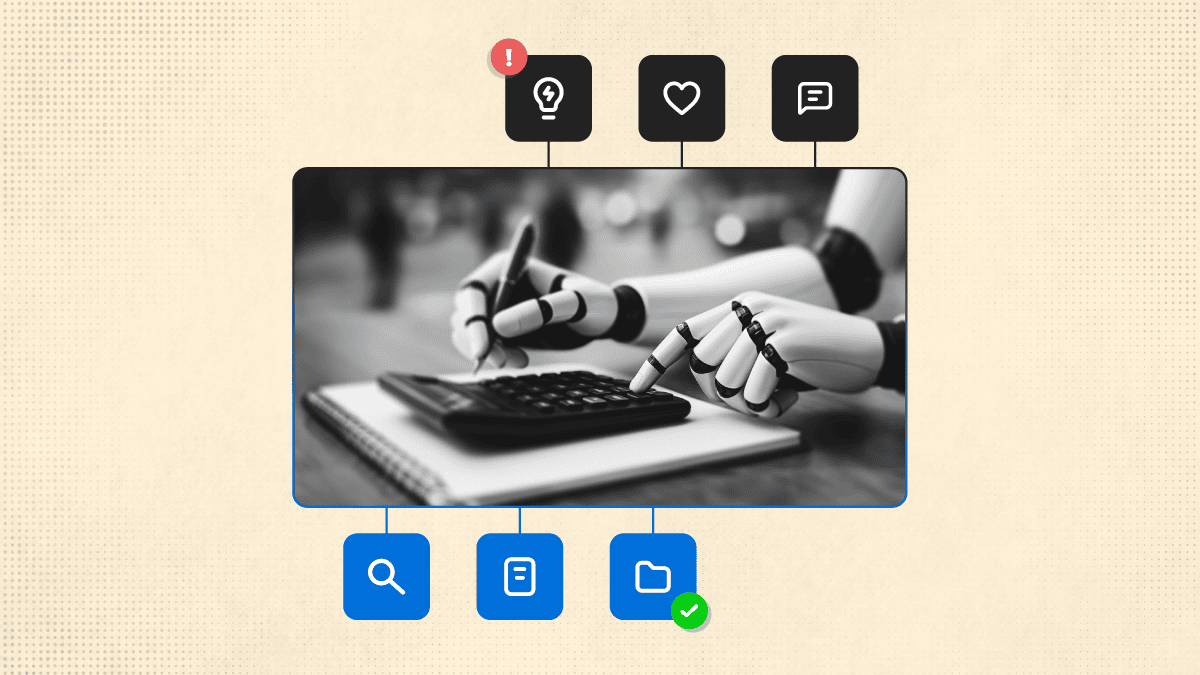- HOME
- Accounting trends & insights
- AI in Accounting: What it can do – and what it can’t
AI in Accounting: What it can do – and what it can’t

Artificial Intelligence (AI) is reshaping the accounting landscape—streamlining processes, reducing manual work, and unlocking powerful insights. From automating data entry to detecting fraud patterns, AI is now an indispensable ally for accountants aiming to boost efficiency and focus on value-driven work. But while AI holds immense promise, it’s not a silver bullet.
Here’s a simple, real-world look at what AI can—and can’t—do in accounting today.
How AI is changing the game
Think of AI as your tireless assistant—one that doesn’t sleep, skip deadlines, or need coffee breaks every couple hours. It takes over the role of your work-buddy and minimises time-consuming tasks, reduces human error, and empowers smarter decisions.
Where AI shines:
Smarter task automation: AI goes beyond routine processing by learning patterns in your data. It can auto-tag transactions, suggest categories, and add contextual headers—reducing manual effort and ensuring consistency.
Conversational insights: Skip scrolling through reports—ask AI questions directly, like “What were my top expenses last quarter?”. With your financial data, it delivers quick, clear answers.
Adaptive reporting: AI makes reports dynamic. It tailors outputs to your queries, highlights key changes, and explains trends—keeping decisions sharp and timely.
Proactive anomaly detection: AI scans transactions for duplicates, outliers, or fraud indicators. By learning from history, it adapts alerts and flags risks early.
... however, there are still places where AI falls behind
Despite its strengths, AI isn’t flawless. It’s only as smart as the data—and the people—behind it. Here are some of its current limitations:
Messy data slows AI down: Clean, structured inputs are key. AI struggles with handwritten notes, blurry scans, or poorly formatted files. A CSV or spreadsheet copy-paste will always deliver better results than extracting from a PDF.
Not self-updating: Tax codes and accounting rules change often. AI doesn’t adapt on its own—it relies on integrations with reliable providers or regular updates to stay accurate.
'Garbage in, garbage out': If wrong or duplicate entries go in, flawed insights come out. Instead of correcting errors, AI may amplify them—making human checks critical.
False alarms without context: AI can flag unusual activity, but not all anomalies are issues. A legitimate outlier, like a one-time bulk purchase, can trigger unnecessary alerts and requires expert review.
Setup and training required: AI tools aren’t plug-and-play. Without guidance and support, teams risk underusing or misinterpreting their potential.
How to get the best of both Worlds
AI and humans don’t compete—they complement each other. So, what are some ways you can maximise value?
Targeted AI training: Don’t stop at generic training. Guide staff on where AI fits in workflows, how to prepare clean and structured data, and the importance of privacy and data security when feeding information into AI systems.
Human-in-the-loop systems: AI can surface anomalies and insights, but professionals must review, validate, and decide on actions. Setting up structured checkpoints ensures AI remains a support tool, and not the final authority.
Built-in compliance updates: Modern platforms like Zoho Books, already integrate regulatory updates. Users should focus less on “manual compliance checks” and more on ensuring their software is properly configured.
Scale your business safely: At volume, even smart systems can misread genuine outliers as risks. Regular expert reviews at scale help filter noise, catch blind spots, and maintain trust in AI-driven processes.
AI + Humans: The future of accounting
AI is powerful, but not universal. It excels at automation, data crunching, and spotting patterns, but falls short when context, ethics, or strategic judgment are required.
Use AI to speed up repetitive processes and surface insights—but know its limits. Complex decisions, interpreting anomalies, or weighing the bigger business impact are areas where professional expertise remains irreplaceable.
The best results come from applying AI selectively—leveraging its strengths while recognizing situations where human review and decision-making are non-negotiable.
To explore more insights on how technology is reshaping accounting, check out the Zoho Books Academy’s section on Accounting Trends and Insights.